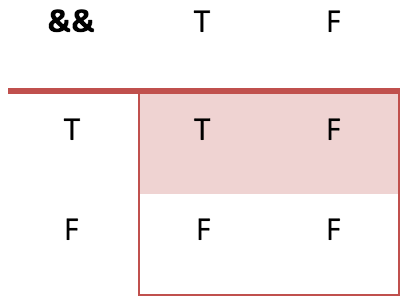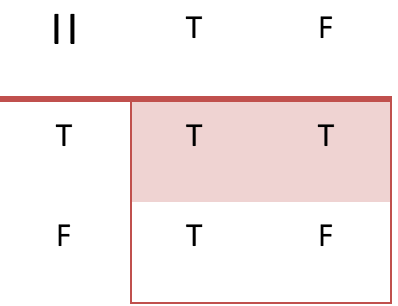| Code Bar | |
|---|---|
&& |
AND |
|| |
OR |
! |
NOT |
Logical operators are operators that form compound Boolean expressions that return a Boolean result. Essentially, the AND/OR operations are put in between two existing Boolean expressions and determine a new Boolean result.
The three main logical operators are shown above in the Code Bar. The meanings of these operations are:
-
&& returns true if both Boolean expressions are true
-
|| returns true if one of the Boolean expressions are true
-
! is put in front of a Boolean to reverse its value
Truth tables are tables that represent the outcome of the operations. The truth tables for the AND/OR operations are:


These logical operators have a special syntax, which is shown below:
true && false -> false
false || true -> true
!false -> true
!true -> false
Logical operators are most commonly used in conjunction with relational operators, which were described last lesson (Relational Operators). Here is an example:
(4 == 5) || (7 >= 3)
Since (4 == 5) is false, and (7 >= 3) is true, this statement can be further broken down into the following:
false || true -> true
Looking at the truth tables, we can see that the above expression evaluates to true. Here are some more examples:
(5 > 4) && (6 == 6) -> true
(3 <= 2) || (50 != 50) -> false
!(6 > 3) -> false
These operators are often used in if statements, for loops, and while loops, which we will get to in lessons 12-15, Loops and Conditionals.
Lesson Quiz
What is output to the console in each of the following scenarios?
int i = 5;
boolean x = (i > 5) && ((12 * 2) != 24);
System.out.println(x);
System.out.println(!((5000 / 10) > 700));
double y = 3.65;
System.out.println(((y * 5) < 15) || true);
Written by Chris Elliott
Notice any mistakes? Please email us at learn@teamscode.com so that we can fix any inaccuracies.